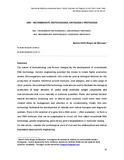ADN – Recombinante: biotecnologia, ontologia e protologia
Información Adicional
| Otros Títulos | DNA - Recombinant: biotechnology, and ontology protology - ADN - Recombinante: biotecnología y ontología protología |
| Correo Electrónico | borges272@gmail.com |
| ISSN | 2244-7482 |
| Resumen en otro Idioma | The nature of biotechnology was forever changed by the development of recombinant DNA technology. Genetic engineering provided the means to create highly productive strains, Microorganisms and eukaryotic cells could be used as biological factories for the production of insuline, interferon growth hormone, viral antigens, and a wide range of other proteins. Recombinant DNA technology could also be used to facilitate the biological production of large amounts of useful small molecular weight compounds and macromolecules that occur naturally in miniscule quantities. Plants and animals became natural bioreactors producing new or altered gene products could never have been created either by mutagenesis and selection or by crossbreeding. Finally, this new technology facilitated the development of radically new radical therapies and diagnostic systems. There is the insertion of a gene into a DNA vector – often a plasmid – to form a new DNA molecule, that can be perpetuated in a host cell. Also called recombinat DNA technology, genetic engineering, gene slicing, gene transplantation or molecular cloning. On this article, I explain the prothological word of God and the philosophical and ethical foundation about genetic engineering. |
| Colación | 31 - 46 |
| Periodicidad | semestral |
| País | Venezuela |
| Sección | Revista de Bioética Latinoamericana: Artículos |






